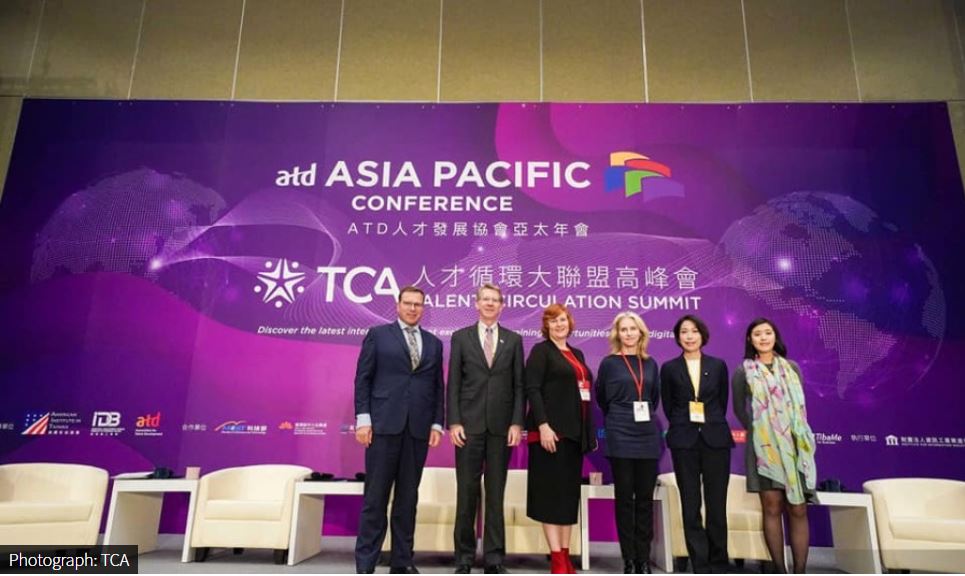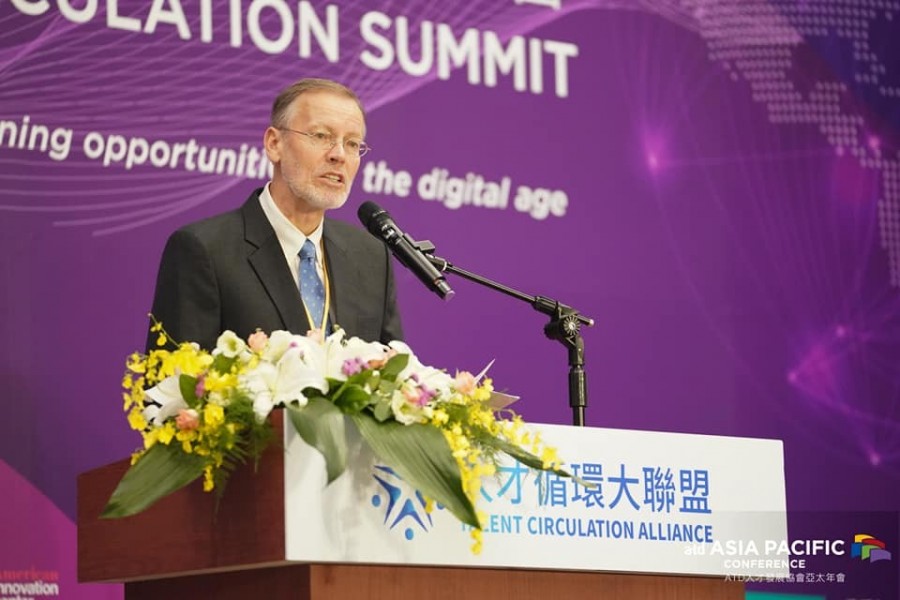Talent Circulation Summit 2019: Recreate Taiwan’s success story by internationalizing its workforce for the digital age

Taiwan does have its glorious past, the time when the post-war economy grew at an unprecedented speed on the basis of industrialization and won the title as one of the four Asian Dragons, neck and neck with Hong Kong, South Korea, and Singapore.
Last week, at the first ever Talent Circulation Summit, AIT Director William Brent Christensen said such success can be largely attributed to talent circulation: those who studied and worked in the US brought what they learned back to Taiwan and fueled the economy by either starting new companies or offering support to existing ones.
Morris Chang, Founder of Taiwan Semiconductor Company (TSMC), is representative of the global talent he described that pushed Taiwan’s economic progress from the 80s. As a speaker at the Summit, he shared with the audience that his 36 years in the US equipped him with a global vision, and it’s the most valuable asset he gained from the experience. “And you learn to be modest when you know the world is huge and there are a lot of talented people,” he argued.
In Chang’s view, talent circulation between Taiwan and the US is the root cause for the global chipmaker’s success as well.
One of the objectives for the Talent Circulation Alliance (TCA), the organizer of the Summit, is to replicate such story of success, according to Director Christensen. The Alliance, working with partners in the public and private sector, academia, and civil society, both in Taiwan and across the globe, seeks to facilitate the circulation of talent between Taiwan and like-minded countries.

The TCA also seeks to help internationally integrate and digitally upgrade Taiwan’s industry and talent to help further its transition to an innovation-based economy, Director Christensen said.
The overall goal, he said, is to internationalize Taiwan’s workforce for the digital age.
Cultivating internationally-oriented talent in Taiwan
For many, Taiwan’s prosperity, starting from the 80s, doesn’t seem to last until today. “Since that time, there has been a perception that Taiwan has started to lag,” Leo Seewald, Chairman of the American Chamber of Commerce in Taipei (AmCham Taipei), said. Despite its burgeoning tech industry, it seems to have been “discounted.”
But some see Taiwan’s future differently. A number of well-known international companies, including Google and Apple, have flocked to Taiwan recently to invest and set up operations.
“The concern is how young people here get involved and position themselves that they can work for these companies,” Mr. Seewald added.
Taking a step back, the core issue is indeed how Taiwan can cultivate internationally-oriented talent to push itself forward as in the past.
Randall Nadeau, CEO of Fulbright Taiwan, said he believes helping students to study aboard facilitates the process because it unlocks the possibility of “experiential learning,” which simulates creativity and broadens horizons. His foundation provides grants for students and scholars from Taiwan to do educational exchange in the US and vice versa.
Talent cultivation and circulation are, in fact, two sides of the same coin, said Mr. Seewald.
In the recent years, an educational reform based on a shift of “knowledge-based to competency-based model has been rolled out, said Anting Liu, Founder of Teach for Taiwan. She gave recognition to such move, noting that Taiwanese students will thus be able to leverage their creativity and put what they’ve learnt into practice. In her organization, she also allows student volunteers to develop leadership through teaching kids in rural schools.
Drawing on her background in leadership and neuroscience, Britt Andreatta, CEO of 7th Mind, pointed out the importance of developing emotional intelligence. “It’s about knowing yourself and managing yourself, and once you do that well, that makes you better at understanding others, building relationships and influencing others,” she said.
She also suggested that everyone set aside a couple of hours a week for creativity, working on change, or developing themselves as a leader.
Meanwhile, Mr. Nadeau said cross-disciplinary learning is another key to cultivating oneself. “For every person who wants to make a difference, the best advice I can give is to develop your curiosity, to want to know about anything,” he said.
One should think about what they can do with their own mind. It’s about not only “crossing international boundaries, but also crossing intellectual boundaries,” he said.
Making Taiwan a magnet for international talent
While opening possibilities for the Taiwanese to go abroad, it’s crucial to make their hometown a better location for personal growth and career development, which will attract not only them to return and bring back new perspectives but also foreign talent to stay and contribute to the economy. This is in line with another objective that the TCA is working on: to prevent brain drain in Taiwan.
With the declining birth rate and aging population, it should be one of the top priorities for the country to remain competitive in the digital era, said Mr. Seewald.
Nevertheless, Ms. Liu said she has always felt a sense of pessimism among Taiwanese young people over the country’s future; she encourages a shift in mindset.
“If you flip the map counterclockwise, you see a very different perspective. You start to see Taiwan at the center, especially in the digital era, of some of the biggest markets and opportunities from Japan to Indonesia,” she said. “If we liberate ourselves from some of the psychological limitations we put on ourselves, there are great opportunities in Taiwan.”
“That needs to live in the hearts and minds of the people who are here,” Ms. Andreatta responded. “Because as you start to see it, that energetically travels around the world.”
“People want to be where other people are happy and loving where they are and their experiences,” she added.
Further, Melissa Daimler, Principal of Daimler Partners, said it’s crucial that Taiwan define clearly and intentionally what it has that is nowhere else. It’s what differentiates itself from other cultures that attracts foreign talent to come here.
As a congresswoman for the ruling party, Karen Yu is working on policies that will practically encourage more foreign talent to work and live in Taiwan, including the Foreign Professionals Act that has come into effect last year. She said she will seek to further include in this Act not only the program that allows foreigners to do internship in Taiwan but one that facilitates the exchange between high tech companies overseas and local startups.
〔Original :Meet Startup @ TW〕
Source: Meet Global (Open in new window)